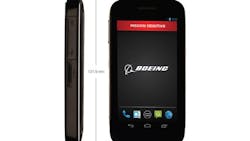Boeing Self-Destructing Smartphone: Do Not Try to Open
NEW YORK -- Boeing (IW 1000/14) is launching a self-destructing smartphone to help spies, diplomats and others keep secrets secure.
Don't even think about trying to open or tamper with the Boeing Black phone, the company warns.
"There are no serviceable parts on Boeing's Black phone and any attempted servicing or replacing of parts would destroy the product," Boeing says in documents filed with the Federal Communications Commission.
"The Boeing Black phone is manufactured as a sealed device both with epoxy around the casing and with screws, the heads of which are covered with tamper proof covering to identify attempted disassembly.
"Any attempt to break open the casing of the device would trigger functions that would delete the data and software contained within the device and make the device inoperable."
The company says its Boeing Black phone, which uses encryption both in its stored data and transmission will use the Google Android system with "enhanced software security."
"Boeing's Black phone will be sold primarily to government agencies and companies engaged in contractual activities with those agencies that are related to defense and homeland security," Boeing says
"The device will be marketed and sold in a manner such that low level technical and operational information about the product will not be provided to the general public. Detailed technical information distributed at trade shows will be limited or protected by non-disclosure agreements."
Boeing has not announced when the phone would be available, but a spokeswoman said it would be "soon."
The device should not be confused with the new encrypted Blackphone, developed by the U.S. secure communications firm Silent Circle with Spanish manufacturer Geeksphone. The Blackphone, which is on sale to the general public, offers encrypted communications and protection against snooping.
Boeing's website says its device was developed because there was nothing on the market to meet the needs of the U.S. defense and security communities.
"Despite the continuous innovation in commercial mobile technology, current devices are not designed from inception with the security and flexibility needed to match their evolving mission and enterprise environment," the website says.
The device "is built upon layers of trust from embedded hardware, operating system policy controls, and compatibility with leading mobile device management systems."
The U.S. military has long used BlackBerry phones, and more recently commercially available Android and Apple smartphones, for U.S. armed phones.
Copyright Agence France-Presse, 2014
About the Author
Agence France-Presse
Copyright Agence France-Presse, 2002-2025. AFP text, photos, graphics and logos shall not be reproduced, published, broadcast, rewritten for broadcast or publication or redistributed directly or indirectly in any medium. AFP shall not be held liable for any delays, inaccuracies, errors or omissions in any AFP content, or for any actions taken in consequence.
